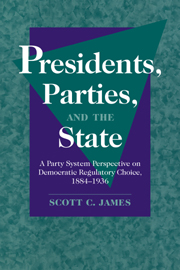 Presidents, Parties, and the State
Presidents, Parties, and the State Book contents
- Frontmatter
- Contents
- Acknowledgments
- 1 Introduction: Parties, Presidential Elections, and Regulatory Choice – A Party System Perspective
- 2 Swing States, Business Mugwumps, and the Interstate Commerce Act of 1887
- 3 The Progressive Party Vote and the Federal Trade Commission Act of 1914
- 4 Progressive Republicans and the “Death Sentence” for Public Utility Holding Companies During America's Second New Deal
- 5 Conclusion: Parties and the American Regulatory State
- Bibliography
- Index
3 - The Progressive Party Vote and the Federal Trade Commission Act of 1914
Published online by Cambridge University Press: 06 January 2010
- Frontmatter
- Contents
- Acknowledgments
- 1 Introduction: Parties, Presidential Elections, and Regulatory Choice – A Party System Perspective
- 2 Swing States, Business Mugwumps, and the Interstate Commerce Act of 1887
- 3 The Progressive Party Vote and the Federal Trade Commission Act of 1914
- 4 Progressive Republicans and the “Death Sentence” for Public Utility Holding Companies During America's Second New Deal
- 5 Conclusion: Parties and the American Regulatory State
- Bibliography
- Index
Summary
A politician, a man engaged in party contests, must be an opportunist… If you want to win in party action, I take it for granted you want to lure the majority to your side. I never heard of any man in his senses who was fishing for a minority… You have got to take the opportunity as you find it, and work on that, and that is opportunism, that is politics, and it is perfectly legitimate.
Woodrow WilsonThe Trade Commission act represents a totally different approach [from the Sherman Act], a spirit strangely contradictory to the campaign theories of the President … It is not the attitude anyone could have expected to see emerge from the tradition of the Democratic party. But nevertheless it did…
In this Trade Commission act is contained the possibility of the radical reversal of many American notions about trusts, legislative power, and legal procedure. It may amount to historic political and constitutional reform. It seems to contradict every principle of the party which enacted it.
Herbert CrolyIntroduction
On 30 May 1914, Theodore Roosevelt fired the opening shots of the midterm elections against the party of Woodrow Wilson. Roosevelt framed the off-year elections as a referendum on the failures of the New Freedom, the Democrats' three-pronged program to curb the power of the trusts. Rather than bringing monopolies to heel, the former president asserted, Democratic policies had simply driven the economy into recession.
- Type
- Chapter
- Information
- Presidents, Parties, and the StateA Party System Perspective on Democratic Regulatory Choice, 1884–1936, pp. 123 - 199Publisher: Cambridge University PressPrint publication year: 2000
